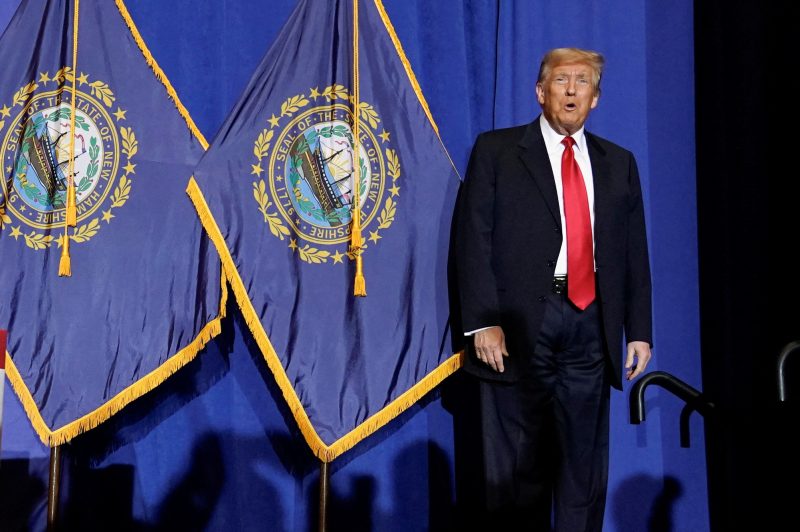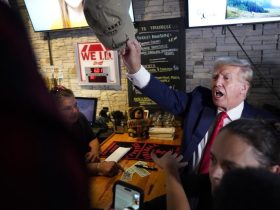Fresh from his landslide victory in the Iowa caucuses, former president Donald Trump on Tuesday flew to Manhattan to watch the selection of a jury to determine whether he should pay damages for defamatory comments he made in office. Only after that did he head to New Hampshire, to deliver a campaign speech ahead of next Tuesday’s critical Republican primary.
Despite having spent the morning in court, Trump appeared bullish onstage during the evening rally, attributing his strong performance in the caucuses to the criminal indictments. “Last night we won in the state of Iowa. Nobody’s ever come close to getting the kind of numbers I got,” he said. “If I didn’t get indicted all these times and if they didn’t unfairly go after me, I would have won, but it would have been much closer. I tell you, I don’t know if I would have made the trade. I might have just liked the position we’re in right now.”
The spectacle captured a remarkable moment in U.S. history, as a former president who faces dozens of criminal charges went from the glow of a political triumph to a courthouse where he has been found liable for sexual abuse. The juxtaposition underlined that many Republican voters, at least judging by the party’s first nominating contest, appear willing and even eager to embrace Trump in the face of legal accusations, court verdicts and the norms that have guided U.S. politics for two centuries.
That was a source of frustration Tuesday for Trump’s top rivals, Florida Gov. Ron DeSantis and former U.N. ambassador Nikki Haley. Dan Eberhart, a prominent DeSantis backer, said that, “given the reality on the ground,” the DeSantis campaign “did what we had to do” in receiving 21 percent to Trump’s 51 percent, putting him in a distant second place just ahead of Haley’s 19 percent.
But Eberhart acknowledged that the Republican nominating contest now depends “on Trump and whether or not he makes mistakes between now and Super Tuesday,” on March 5, when more than a dozen states hold primaries. “If Trump doesn’t make mistakes, it’ll all be for naught,” Eberhart added.
Haley, for her part, claimed she has not been paying attention to the cases against Trump, which involve allegations ranging from trying to overturn the 2020 election to mishandling classified documents. But she told CNN in New Hampshire that Trump’s legal challenges are a distraction and the GOP nominee should not be someone who is “sitting in a courtroom.”
“We can’t continue to be distracted,” Haley said. “We can’t continue to be in chaos.”
Overall, Tuesday was a day for operatives on all sides to parse the meaning of the low-turnout caucuses where Trump fulfilled longtime predictions of a decisive victory. But while Haley sought to bolster her support in New Hampshire in hopes of an upset there and DeSantis set his sights on South Carolina, Trump’s day was an odd mix of a victory lap and a reminder of why some voters, including in the GOP, harbor doubts about his character and prospects.
The jury selection that Trump attended was in preparation for a trial on whether he should be ordered to pay damages for defamatory comments Trump made in 2019 about the writer E. Jean Carroll, who has said Trump sexually assaulted her and then derided her when she spoke out publicly. Carroll has already been awarded $5 million at a previous trial for sexual abuse and defamation related to comments Trump made later, in 2022.
But the most striking takeaway was that Trump appears to be thriving in the primary contest despite his numerous clashes with the legal system, events that would have been politically fatal for most of the country’s history. At his rally, he claimed baselessly that Democrats “go after their political opponents with the [Justice Department] and the FBI. That’s me, they go after me.” He added, “I’ve been indicted more than Alphonse Capone.”
Trump often states, falsely, that he is a victim of a weaponized legal system designed to keep him away from a second term in the White House, and that message has solidified his support among Republican primary voters. How it will resonate with the broader electorate, however, is unclear.
During his victory speech in Iowa on Monday night, Trump made reference to his court appearances. “I go to a lot of courthouses because of Biden, because they’re using that for election interference,” he said.
While Trump repeatedly claims that the multiple investigations he faces are a result of the Justice Department being used against him, special counsel Jack Smith and Attorney General Merrick Garland have said that Smith’s charging decisions were made independently of the White House, in accordance with Justice Department rules.
Smith is investigating Trump in connection with two separate grand jury indictments: one in Florida for allegedly mishandling classified documents at his Mar-a-Lago home, and a second in D.C. for allegedly conspiring to obstruct the results of the 2020 election. The D.C. trial is scheduled to begin on March 4 — the day before Super Tuesday — while the Florida trial is expected to begin on May 20. Pretrial proceedings are ongoing, and one or both could be delayed.
Separately, the former president also faces two other criminal indictments: one in New York over charges that he falsified business records in connection to payments made to an adult-film actress, and one in Georgia, where he faces 13 criminal charges related to alleged attempts to overturn the results of the 2020 election in that state. While there is no start date assigned yet for the Georgia trial, the New York trial is scheduled to begin on March 25.
Because the trial dates for those cases are peppered throughout the spring, when Trump will be on the campaign trail, days like Tuesday — when he appeared at court in the morning and on rally stages at night — will likely become commonplace throughout the rest of the GOP primary.
The Manhattan trial where Trump appeared Tuesday is not connected to the four criminal indictments, but is rather a civil case brought on by Carroll. Trump has long denied that he had any sexual encounter with her.
Hours after his courtroom appearance, the former president was greeted in New Hampshire by hundreds of supporters who stood for hours in snow and sleet to see the former president at a country club a few miles from the Massachusetts border. Trump appeared onstage alongside entrepreneur Vivek Ramaswamy, who ended his own bid on Monday night after finishing a distant fourth in Iowa. Immediately after ending his campaign, Ramaswamy endorsed the former president.
Polls in New Hampshire show Trump comfortably ahead of DeSantis and Haley, leaving the two of them battling each other and hoping to make respectable enough showings in upcoming primaries to credibly claim to be rivals to Trump.
In the week leading up to the New Hampshire primary, Trump is expected to make slashing attacks especially against Haley, who has been gaining ground in the state. According to a Trump adviser who spoke on the condition of anonymity in order to speak freely about campaign dynamics, Trump is looking to focus on Haley’s “globalist agenda.”
Speaking to voters in New Hampshire, Trump mocked Haley and the remarks she delivered after the Iowa caucuses on Monday night, in which she claimed the Republican primary is now a two-person race between her and Trump. “You’d almost think she won,” Trump said.
New Hampshire Gov. Chris Sununu (R), who has endorsed Haley and spent Tuesday campaigning alongside her in the state, sought to tie Trump’s legal woes to the campaign trail, arguing that Americans can’t wait for an “external factor” like his court cases to “take Trump down.”
“That’s really not happening. That is a hypothetical,” he told MSNBC. “You beat Donald Trump at the ballot box.”
While Sununu’s endorsement was a major win for Haley, Iowa Gov. Kim Reynolds’s endorsement of DeSantis did little to enable him to close the gap with Trump in her state.
DeSantis, meanwhile, was scheduled to appear at a town hall in New Hampshire on Tuesday night, but he is expected to spend most of his time and resources in South Carolina, where his allies say he has to beat Haley in the Feb. 24 primary in order to stay in the race. Haley is a former governor of the state, so a defeat there would be a significant political blow.
DeSantis has told donors he has enough money to stay in the race through South Carolina. And while he appears for now to be targeting Haley more than Trump, he has also told allies he will stay in the race partially because he believes Trump could be convicted before the Republican National Convention in mid-July.
Colby Itkowitz, Joel Achenbach and Josh Dawsey contributed to this report.








